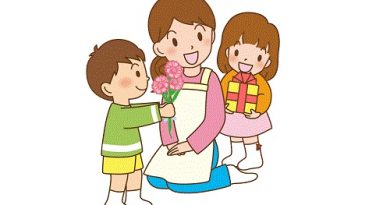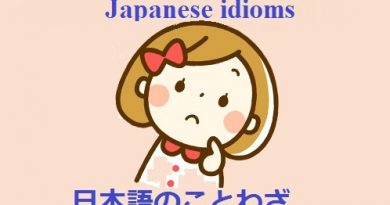The 50 most common Japanese idioms
Idioms are one of the important factors in a language. In this post, we will introduce to you the lesson : The 50 most common Japanese idioms. Let’s start!
Contents
- 1 猫に小判 (Neko ni koban) – Give the cat gold coins
- 2 五十歩百歩 (Gojuppo hyappo) – 50 steps, 100 steps
- 3 虎穴に入らずんば虎子を得ず (Koketsu ni hairazunba koji wo ezu) – If you do not enter the tiger’s cave, you will not catch its cub
- 4 三人寄れば文殊の知恵 (Sannin yoreba monju no chie) – If three people gather, the wisdom of Manjushri
- 5 灯台下暗し (Toudaimoto kurashi) – It is darkest under the lamp post
- 6 急がば回れ (Isogaba maware) – More haste, less speed
- 7 転ばぬ先の杖 (Korobanu saki no tsue) – A walking stick before stumbling
- 8 先んずれば人を制す (Sakinzureba hito wo seisu) – The early bird gets the worm
- 9 聞いて極楽見て地獄 (Kiite gokuraku mite jigoku) – What is a paradise on hearsay maybe a hell at sight
- 10 猫の手も借りたい (Neko no te mo karitai) – Wanting even the help of a cat
- 11 疑心暗鬼 (Gishin anki) – Suspicion will raise bogies
- 12 可愛い子には旅をさせよ (Kawaii ko ni wa tabi wo saseyo) – Spare the rod and spoil the child
- 13 ちりも積もれば山となる (Chiri mo tsumoreba yama to naru) – Even dust becomes a mountain if piled together
- 14 短気は損気 (Tanki wa sonki) – Haste makes waste
- 15 嘘も方便 (Uso mo houben) – Circumstances may justify a lie
- 16 魚心あれば水心 (Uogokoro areba mizugokoro) – If a fish is friendly toward water, water will be kind to the fish too
- 17 売り言葉に買い言葉 (Uri kotoba ni kai kotoba) – Tit for tat
- 18 雲泥の差 (Undei no sa) – A world of difference
- 19 好きこそ物の上手なれ (Suki koso mono no jouzu nare) – What one likes, one will do well
- 20 雀の涙 (Suzume no namida) – Sparrow tears
- 21 坊主憎けりゃ袈裟まで憎い (Bouzu nikukerya kesa made nikui)
- 22 親の心子知らず (Oya no kokoro ko shirazu) – No child knows how dear he is to his parents
- 23 三つ子の魂百まで (Mitsugo no tamashiihyaku made) – The soul of a child of three at 100
- 24 井の中の蛙大海を知らず (I no naka no kawazu taikai wo shirazu) – The frog in the well
- 25 鬼の目にも涙 (Oni no me ni mo namida) – A tear in the ogre’s eye
- 26 知らぬが仏 (Shiranuga hotoke)
- 27 青天の霹靂 (Seiten no hekireki) – A bolt out of the blue
- 28 早起きは三文の徳 (Haya oki wa sanmon no toku) – Those who get up early will get three coins
- 29 火のないところに煙は立たぬ (Hi no nai tokoro ni kemuri wa tatanu) – There is no smoke without fire
- 30 出る杭は打たれる (Deru kui wa uta reru) – The nail that sticks out gets hammered down
- 31 百聞は一見に如かず (Hyakubun wa ikken ni shikazu) – One eye-witness is better than many hearsays
- 32 仏の顔も三度まで (Hotoke no kao mo sando made) – If you touch the Buddha’s face three times, he will get annoyed
- 33 九死に一生を得る (Kyuushi ni isshou wo uru)
- 34 旅は道連れ世は情け (Tabi wa michidzure yo wa nasake) – In traveling, a companion, in life, sympathy
- 35 渡る世間に鬼はない (Wataru seken ni oni wa nai) – There is no demon in the world
- 36 君子危うきに近寄らず (Kunshi ayauki ni chikayorazu)
- 37 棚からぼた餅 (Tana kara bota mochi) – Sticky rice cake on the shelf
- 38 蛙の子は蛙 (かえるのこはかえる) – The child of a frog is a frog
- 39 窮鼠猫を噛む (Kyuuso neko wo kamu) – A cornered rat will bite a cat
- 40 同じ穴のムジナ (Onaji ana no mujina) – Badgers of the same hole
- 41 覆水盆に反らず (Fukusuibon ni kaerazu) – Spilt water won’t go back into its tray
- 42 笑う門には福来たる (Warau kado ni wa fuku kitaru) – Good fortune and happiness will come to those who smile
- 43 蓼食う虫も好き好き (Tade kuu mushi mo sukizuki)
- 44 焼け石に水 (Yake ishi ni mizu) – Pouring water on a hot stone
- 45 武士は食わねど高楊枝 (Bushi wa kuwanedo takayouji) – A samurai pretends he has eaten well when he has no food
- 46 暖簾に腕押し (Noren ni ude oshi) – To push aside a sign curtain hanging at the shops entrance
- 47 帯に短し襷に長し (Obi ni mijikashi tasuki ni nagashi) – Too short for a belt, too long for a sleeve tie
- 48 親の光は七光り (Oya no hikari wa nana hikari) – Having a famous parent helps
- 49 言わぬが花 (Iwanuga hana) – Silence is golden
- 50 一寸の虫にも五分の魂 (Issun no mushi ni mo gobu no tamashii) – Even a tiny bug will defend itself
- 51 喉元過ぎれば熱さを忘れる (Nodomoto sugireba atsusa wo wasureru) – Once it’s past the throat, one forgets the heat of the swallowed object
- 52 残り物には福がある (Nokori mono ni wa fuku ga aru) – There is fortune in leftovers
- 53 山椒は小粒でもぴりりと辛い (Sanshou wa kotsubu demo piririto karai) – Japanese pepper is small-grained but has a tongue-numbing tingle
猫に小判 (Neko ni koban) – Give the cat gold coins
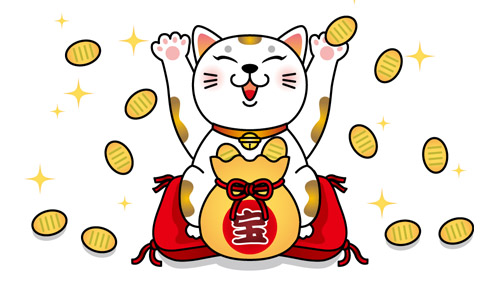
Meaning: It is a great waste to give an valuable item to someone who does not understand its value.
Example: 機械音痴の人にパソコンプレゼントしても猫に小判だよー!
Kikai onchi no hito ni pasokon purezento shite mo neko ni kobanda yo ~!
Giving a computer to someone who is hopeless with machines is like giving the cat gold coins!
五十歩百歩 (Gojuppo hyappo) – 50 steps, 100 steps
Meaning: Scant difference; six of one and half a dozen of the other.
Example: 彼のミスも彼女のミスも五十歩百歩だ。
Kare no misu mo kanojo no misu mo gojuppo hyappo da.
His mistake and her mistake have scant difference.
虎穴に入らずんば虎子を得ず (Koketsu ni hairazunba koji wo ezu) – If you do not enter the tiger’s cave, you will not catch its cub
Meaning: Can’t do big things without taking risks. No pain no gain.
Example: この案件はリスクは多いが、今月の売上達成するにはやるしかない。いわば、虎穴に入らずんば虎子を得ずだ。
Kono anken wa risuku wa ooi ga, kongetsu no uriage tassei suru ni hayaru shika nai. Iwaba, koketsu ni hairazunba koji wo ezuda.
This project has many risks, but it must be done to achieve the sales of this month. So to speak, you will not get the tiger cub without entering the tiger’s den!
三人寄れば文殊の知恵 (Sannin yoreba monju no chie) – If three people gather, the wisdom of Manjushri
Meaning: Two heads are better than one.
Example: 一般人の俺ら3人でも三人寄れば文殊の知恵。この問題の打開策は必ず見つけられるはずだ!
Ippanjin no orera sannin demo sannin yoreba monju no chie. Kono mondai no dakaisaku wa kanarazu mitsukerareru hazu da!
Although we are just 3 normal people, two heads are better than one. We will find a solution to this problem!
灯台下暗し (Toudaimoto kurashi) – It is darkest under the lamp post
Meaning: It is often difficult for people to recognize something that are so familiar to them.
Example: 見つからないと思っていた物がバッグの奥底にあった。灯台下暗しだ。
Mitsukaranai to omotte ita mono ga baggu no okusoko ni atta. Toudaimoto kurashi da.
The item that I thought I couldn’t find was in the bottom of my bag. It’s darkest under the lamp post.
急がば回れ (Isogaba maware) – More haste, less speed
Meaning: When you’re in a hurry, instead of choosing a short way that can be risky to go, it’s better to choose the detour which is far but safe.
Example: 明日までの案件だが、しっかりとチェックしながら進めるんだ!ミスがあったら対応に追われるからな!急がば回れだ!
Ashita made no anken da ga, shikkari to chekku shinagara susumeru n da! Misu ga attara taiou ni owarerukara na! Isogaba maware da!
Make sure you proceed the project that is due tomorrow while checking it carefully! If you make a mistake, you have to deal with the responses! More haste less speed, after all!
転ばぬ先の杖 (Korobanu saki no tsue) – A walking stick before stumbling
Meaning: Prevention is better than cure.
Example: 転ばぬ先の杖ということで足元に注意して慎重に渡りましょう。
Korobanu saki no tsue to iu koto de ashimoto ni chuuishite shinchou ni watarimashou.
Prevention is better than cure, pay attention to your feet and cross (the road) carefully!
先んずれば人を制す (Sakinzureba hito wo seisu) – The early bird gets the worm
Meaning: If you act quickly, you will prevail over others.
Example: 新しい技術は率先して採用して、他社に差をつけていきましょう。先んずれば人を制すとはこのことです。
Atarashii gijutsu wa sossenshite saiyoushite, tasha ni sa wo tsukete ikimashou. Sakinzureba hito wo seisu to hako no koto desu.
Let’s take the lead in adopting new technologies to make a difference with other companies. It’s called “the early bird gets the worm”!
聞いて極楽見て地獄 (Kiite gokuraku mite jigoku) – What is a paradise on hearsay maybe a hell at sight
Meaning: There is a big difference between what you hear from others and what you see in your own eyes.
Example: ここの会社は良いと聴いて入社したのにとんだブラック企業だったな。聞いて極楽見て地獄です。
Koko no kaisha wa yoi to kiite nyuusha shita no ni tonda burakku kigyou datta na. Kiite gokuraku mite jigoku desu.
I heard that this company was good so I joined it, but it was a black company. What is a paradise on hearsay maybe a hell at sight.
猫の手も借りたい (Neko no te mo karitai) – Wanting even the help of a cat
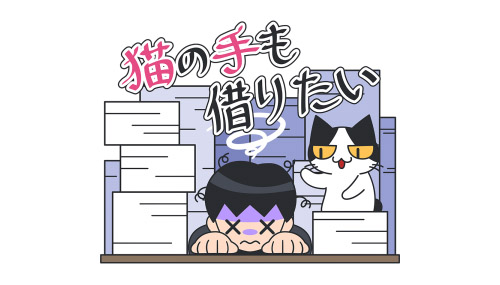
Meaning: Extremely busy.
Example: 案件をたくさん抱えていて猫の手も借りたいほど忙しい。
Anken wo takusan kakaete ite neko no te mo karitai hodo isogashii.
Having so many project, I’m extremely busy now.
疑心暗鬼 (Gishin anki) – Suspicion will raise bogies
Meaning: Once you suspect something, everything else will look suspicious.
Example: 村に殺人鬼が住んでいるという情報から、村人が全員が疑心暗鬼になってきている。
Mura ni satsujinki ga sunde iru to iu jouhou kara, murabito ga zenin ga gishin angi ni natte kite iru.
There is information that the murderer lives in the village, so all the villagers are becoming suspicious.
可愛い子には旅をさせよ (Kawaii ko ni wa tabi wo saseyo) – Spare the rod and spoil the child
Meaning: If you love your children, send them out into the world.
Example: 甘やかしてばかりいると子供はダメになります。可愛い子には旅をさせよというもので、世の中の辛さを経験させて成長させましょう。
Amayakashite bakari iru to kodomo wa dame ni narimasu. Kawaii ko ni wa tabi wo saseyo to iu mono de, yo no naka no karasa wo keiken sasete seichousasemashou.
If you just pamper your child, it will be spoiled. Spare the rod and spoil the child, so let’s the child experience hardship and let it grow up!
ちりも積もれば山となる (Chiri mo tsumoreba yama to naru) – Even dust becomes a mountain if piled together
Meaning: Many a little makes a mickle.
Example: 1円も無駄にしてはいけませんよ。ちりも積もれば山となるというもので小さな節約が大きな貯金になるのです。
1 en mo muda ni shite wa ikemasen yo. Chiri mo tsumoreba yama to naru to iu monode chiisana setsuyaku ga ookina chokin ni naru no desu.
Don’t waste even 1 yen! Many a little makes a mickle, small savings will become big savings.
短気は損気 (Tanki wa sonki) – Haste makes waste
Meaning: Anger and haste hinder good counsel.
Example: あの人はすぐキレるから友達が少ないんだ。短気は損気とはよく言ったものだね。
Ano hito wa sugu kireru kara tomodachi ga sukunai n da. Tanki wa sonki to wa yoku itta mono da ne.
That person easily gets angry, so he has few friends. He is said that his anger hindered good counsel.
嘘も方便 (Uso mo houben) – Circumstances may justify a lie
Meaning: Depending on the circumstances, lying is also necessary.
Example: 祖母から電話があり、元気かと尋ねられたので、風邪をひいていたが噓も方便で元気だと答えた。
Sobo kara denwa ga ari, genki ka to tazunerareta node, kaze wo hiite itaga uso mo houben de genkida to kotaeta.
My grandmother called me and asked if I was fine, so even though I had a cold, I said “I’m fine”. Circumstances may justify a lie.
魚心あれば水心 (Uogokoro areba mizugokoro) – If a fish is friendly toward water, water will be kind to the fish too
Meaning: If you do a favor for somebody, you will get a return favor.
Example: この前は先輩に仕事を手伝ってもらったんですから、今度は私が先輩の仕事、手伝います。魚心あれば水心ですからね。
Konomae wa senpai ni shigoto o tetsudatte moratta n desu kara, kondo wa watashi ga senpai no shigoto, tetsudaimasu. Uogokoro areba mizugokorodesukara ne.
Because I received help from my senior before, this time I will help him. If a fish is friendly toward water, water will be kind to the fish too.
売り言葉に買い言葉 (Uri kotoba ni kai kotoba) – Tit for tat
Meaning: Tit for tat (verbally).
Example: 2人の争いは売り言葉に買い言葉ですね。
Futari no arasoi wa uri kotoba ni kai kotoba desu ne.
The quarrel between the two of them is tit for tat!
雲泥の差 (Undei no sa) – A world of difference
Meaning: Wide difference.
Example: 彼の年収と私の年収は雲泥の差です。
Kare no nenshuu to watashi no nenshuu wa undeinosa desu.
His annual income and my annual income have big difference.
好きこそ物の上手なれ (Suki koso mono no jouzu nare) – What one likes, one will do well
Meaning: You become good at what you like doing.
Example: この子は絵が好きで最初は下手でしたが、だんだんと上手くなってきました。まさに好きこそものの上手なれですね。
Konoko wa e ga sukide saisho wa heta deshita ga, dandan to umaku natte kimashita. Masani sukikoso mono no jouzu nare desu ne.
This child like drawing and was very poor at drawing at first, but he gradually became skilled. What one likes, one will do well, after all.
雀の涙 (Suzume no namida) – Sparrow tears
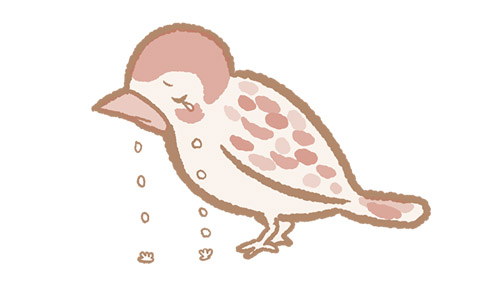
Meaning: Very small quantity.
Example: 僕のボーナスは雀の涙のように少ないんです。
Boku no boonasu wa suzume no namida no you ni sukunai n desu.
My bonus is as little as a sparrow’s tears.
坊主憎けりゃ袈裟まで憎い (Bouzu nikukerya kesa made nikui)
Meaning: If you dislike someone, you will end up hating everything he stands for.
Example: 彼のことが嫌いすぎて、彼の持っているバッグまで憎しみを感じますよ。
Kare no koto ga kirai sugite, kare no motte iru baggu made nikushimi wo kanjimasu yo.
I hate him so much that even the bag he holds is annoying!
親の心子知らず (Oya no kokoro ko shirazu) – No child knows how dear he is to his parents
Example: 親の心子知らずとは言ったもので、息子はあっけらかんとしていますよ。
Oya no kokoroko shirazu to wa itta mono de, musuko wa akkerakan to shiteimasu yo.
They said that “No child knows how dear he is to his parents”, my son looks so blank.
三つ子の魂百まで (Mitsugo no tamashiihyaku made) – The soul of a child of three at 100
Meaning: Although time has passed, the personality traits of childhood has not changed.
Example: 三つ子の魂百までとは言ったもので20歳すぎても今だに落ち着きがないんですよ。
Mitsugo no tama shiihyaku made to wa itta monode 20 sai sugite mo ima dani ochitsuki ga nai n desu yo.
That is the soul of a child of three at 100, you are over 20 years old but not mature at all.
井の中の蛙大海を知らず (I no naka no kawazu taikai wo shirazu) – The frog in the well
Meaning: The frog in the well knows nothing of the great ocean.
Example: 彼はグループの中で威張っているが、井の中の蛙大海を知らずですね。
Kare wa guruupu no naka de ibatteiru ga, I no naka no kawazu taikai wo shirazu desu ne.
He is arrogant in the group but he is just a frog in the well!
鬼の目にも涙 (Oni no me ni mo namida) – A tear in the ogre’s eye
Meaning: Even the most ruthless people sometimes shed tears.
Example: あの部長が映画で泣くとはね。まさに鬼の目にも涙とは言ったものだ。
Ano buchou ga eiga de naku to hane. Masani oni no me ni mo namida to wa itta mono da.
That director cries for the movie. That’s exactly what they say “a tear in the ogre’s eye”!
知らぬが仏 (Shiranuga hotoke)
Meaning: Ignorance is bliss.
Example: 知らぬが仏で彼にこの事実は知らせない方が良いかもしれません。
Shiranugahotoke de kare ni kono jijitsu wa shirasenai kata ga yoi kamo shiremasen.
Ignorance is bliss, it may be better not to let him know the truth.
青天の霹靂 (Seiten no hekireki) – A bolt out of the blue
Meaning: A problem occurred unexpectedly.
Example: 地下鉄サリン事件は正に青天の霹靂だった。
Chikatetsu sarin jiken wa masani seiten no hekireki datta.
The Subway Sarin Incident was a bolt out of the blue.
早起きは三文の徳 (Haya oki wa sanmon no toku) – Those who get up early will get three coins
Meaning: The early bird gets the worm.
Example: 早朝の電車は空いてるので早起きは三文の徳とはよく言ったものですね。
Souchou no densha wa suiteru node hayaoki wa sanmon no toku to wa yoku itta mono desu ne.
The early morning train is empty, so it’s true that “the early burd gets the worm”.
火のないところに煙は立たぬ (Hi no nai tokoro ni kemuri wa tatanu) – There is no smoke without fire
Meaning: Everything has its origin.
Example: 火のないところに煙は立たたない。何からあながちこの噂は完全なデマではないかもしれませんね。
Hi no nai tokoro ni kemuri wa tatata nai. Nani kara anagachi kono uwasa wa kanzen na dema de wanai kamo shiremasen ne.
It’s true that “there is no smoke without fire”. This rumor may not be a hoax at all.
出る杭は打たれる (Deru kui wa uta reru) – The nail that sticks out gets hammered down
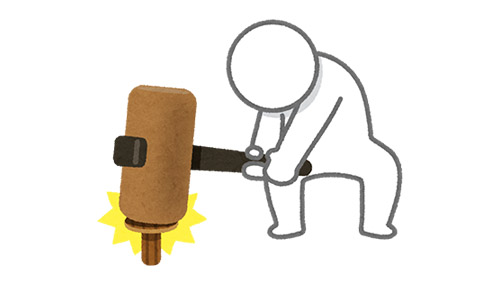
Meaning: People that excel at something become disliked.
Example: 彼は非常に優秀だったが、出る杭は打たれると言った者で左遷されてしまいました。
Kare wa hijou ni yuushuu data ga, deruku I wa utareru to itta mono de sasensarete shimaimashita.
He was very good, but the nail that sticks out gets hammered down, he was eventually demoted.
百聞は一見に如かず (Hyakubun wa ikken ni shikazu) – One eye-witness is better than many hearsays
Meaning: Seeing things in our own eyes is better.
Example: 教科書で地理を勉強するよりも実際に言って確かめた方が勉強になる。百聞は一見に如かずですよ。
Kyoukasho de chiri wo benkyou suru yori mo jissai ni itte tashikameta kata ga benkyou ni naru. Hyakubun wa ikken ni shikazu desu yo.
Rather than studying geography on textbooks, it’s better to actually check and confirm. One eye-witness is better than many hearsays, after all.
仏の顔も三度まで (Hotoke no kao mo sando made) – If you touch the Buddha’s face three times, he will get annoyed
Meaning: Everything has its limits.
Example: また課題を忘れてきたのか。仏の顔も三度までだぞ、真面目に取り組みなさい。
Mata kadai wo wasurete kita no ka. Hotoke no kao mo sando made da zo, majime ni torikumi nasai.
Did you forget to do homework again? Everything has its limits, take it seriously!
九死に一生を得る (Kyuushi ni isshou wo uru)
Meaning: To have a narrow escape from death
Example: あの事故ではまさに九死に一生を得て、なんとか生き延びることができました。
Ano jikode wa masa ni kyuushi ni isshou wo ete, nantoka ikinobiru koto ga dekimashita.
There is a narrow escape from death in that accident, how can they survive.
旅は道連れ世は情け (Tabi wa michidzure yo wa nasake) – In traveling, a companion, in life, sympathy
Meaning: To share joys and sorrows.
Example: 旅は道連れ世は情けで夫婦2人でここまで来ることができました。
Tabi wa michidzure yo wa nasake de fuufu futari de koko made kuru koto ga dekimashita.
The couple shared joys and sorrows with each other and then they were able to come here.
渡る世間に鬼はない (Wataru seken ni oni wa nai) – There is no demon in the world
Meaning: All people aren’t evil, don’t distrust everyone.
Example: 渡る世間に鬼はない。私は全国津々浦々訪れてそう思いました。
Wataruseken ni oni wanai. Watashi wa zenkoku tsutsuuraura otozurete sou omoimashita.
All people aren’t evil, don’t distrust everyone. I have visited all over the country with such a thought.
君子危うきに近寄らず (Kunshi ayauki ni chikayorazu)
Meaning: A wise man keeps away from danger.
Example: 君子危うきに近寄らず。この案件には手を出さない方が身のためかもしれません。
Kunshi ayau ki ni chikayorazu. Kono anken ni wa te wo dasanai kata ga mi no tame kamoshiremasen.
A wise man keeps away from danger. It is better for you not to work on this project.
棚からぼた餅 (Tana kara bota mochi) – Sticky rice cake on the shelf
Meaning: Having an unexpected piece of good luck.
Example: 急に臨時収入が入って棚からぼた餅の気分ですよ。
Kyuu ni rinji shuunyuu ga haitte tana kara bota mochi no kibun desu yo.
I suddenly have a temporary income, it’s a sticky rice cake on the shelf!
蛙の子は蛙 (かえるのこはかえる) – The child of a frog is a frog
Meaning: Like father, like son.
Example: 息子もやはり私と同じ道を歩みました。蛙の子は蛙とは言ったものですね。
Musuko mo yahari watashi to onaji michi wo ayumimashita. Kaeruno ko wa kaeru to wa itta mono desu ne.
My son also took the same path as me. The child of a frog is a frog, after all.
窮鼠猫を噛む (Kyuuso neko wo kamu) – A cornered rat will bite a cat
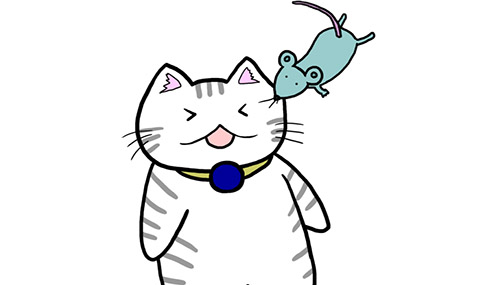
Meaning: Despair turns cowards courageous.
Example: 彼があれだけの反撃にでるとは窮鼠猫を噛むとはよくいったものだね。
Kare ga are dake no hangeki ni deru to wa kyuuso neko wo kamu to wa yoku itta monoda ne.
He fights back like a cornered rat biting a cat.
同じ穴のムジナ (Onaji ana no mujina) – Badgers of the same hole
Meaning: Villains of the same stripe.
覆水盆に反らず (Fukusuibon ni kaerazu) – Spilt water won’t go back into its tray
Meaning: A broken relationship won’t be able to be recovered.
Example: 覆水盆に帰らずで元カレとはもう戻れないと思った方が良いよ。
Fukusui bon ni kaerazu de moto kare to wa mou modorenai to omotta kata ga yoi yo.
Spilt water won’t go back into its tray, it’s better to think that you can’t go back to your ex.
笑う門には福来たる (Warau kado ni wa fuku kitaru) – Good fortune and happiness will come to those who smile
Example: あの家族はいつも食卓に笑顔がある。笑う門には福来たる。自然と幸せが訪れるだろう。
Ano kazoku wa itsumo shokutaku ni egao ga aru. Warau kado ni wa fuku kitaru. Shizen to shiawase ga otozureru darou.
That family always has a smile at the dining table. Good fortune and happiness will come to the home of those who smile. Happiness will certainly come to them.
蓼食う虫も好き好き (Tade kuu mushi mo sukizuki)
Meaning: There’s no accounting for taste.
Example: 私がずっと好きだった男性が、あんなにだらしない子と結婚するなんて。蓼食う虫も好き好きだ。
Watashi ga zutto sukidatta dansei ga, annani darashinai ko to kekkon suru nante. Tade kuu mushi mo sukizuki da.
The man I love got married with such an untidy person. there’s no accounting for taste, after all.
焼け石に水 (Yake ishi ni mizu) – Pouring water on a hot stone
Meaning: A drop in the ocean.
Example: 彼の借金に10万円援助したところで焼け石に水だよ。
Kare no shakkin ni 10 man en enjo shita tokoro de yake ishi ni mizu da yo.
I gave him 100,000 yen to help for his debt, but it’s just like pouring water on a hot stone.
武士は食わねど高楊枝 (Bushi wa kuwanedo takayouji) – A samurai pretends he has eaten well when he has no food
Meaning: Keep a stiff upper lip.
Example: 彼は一文無しのくせにいつもスーツを着て堂々としている。武士も食わねど高楊枝ですね。
Kare wa ichi mon nashi no kuse ni itsumo suutsu o kite doudou to shite iru. Bushi mo kuwanedo takayouji desu ne.
He is trivial, but he always wears suits and tries to be dignified. A samurai pretends he has eaten well when he has no food, after all.
暖簾に腕押し (Noren ni ude oshi) – To push aside a sign curtain hanging at the shops entrance
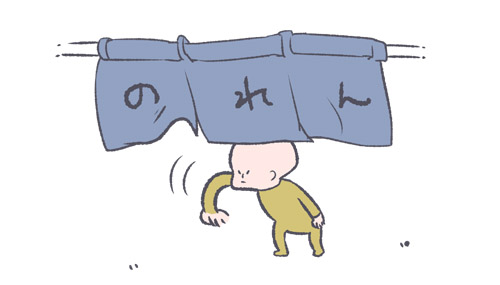
Meaning: Waste of effort.
Example: どんなに彼に言い聞かせても所詮は暖簾に腕押しかもしれません。
Donnani kare ni iikikasete mo shosen wa noren ni ude oshi kamo shiremasen.
No matter how you tell him, it’s just like pushing aside a sign curtain hanging at the shops entrance.
帯に短し襷に長し (Obi ni mijikashi tasuki ni nagashi) – Too short for a belt, too long for a sleeve tie
Meaning: Neither one thing nor the other.
Example: 帯に短し襷に長しでこの板は何の役にも立たない。
Obi ni mijikashi tasuki ni nagashi de kono ita wa nani no yaku ni mo tatanai.
Too short for a belt and too long for a sleeve tie, this plank is useless.
親の光は七光り (Oya no hikari wa nana hikari) – Having a famous parent helps
Meaning: Those who have rich parents or have parents of high status will benefit from their parents.
Example: 彼は親の光は七光りでここまでのし上がってきた。
Kare wa oya no hikari wana na hikari de koko made noshiagatte kita.
He has a famous parent helps, so he has been promoted to this position.
言わぬが花 (Iwanuga hana) – Silence is golden
Example: 昇進したが言わぬが花。自慢せずにいることにするよ。
Shoushin shitaga iwanu ga hana. Jimansezu ni iru koto ni suru yo.
I was promoted but silence is golden. I won’t be proud.
一寸の虫にも五分の魂 (Issun no mushi ni mo gobu no tamashii) – Even a tiny bug will defend itself
Meaning: Even the weakest and smallest beings have their own wills.
Example: ありにも噛まれるとけっこう痛い。一寸の虫にも五分の魂だね。
Ari ni mo kamareruto kekkou itai. Issun no mushi ni mo gobu no tamashii da ne.
It’s quite painful when being bitten by ants. Even a tiny bug will defend itself, right?
喉元過ぎれば熱さを忘れる (Nodomoto sugireba atsusa wo wasureru) – Once it’s past the throat, one forgets the heat of the swallowed object
Meaning: Danger past and God forgotten.
Example: 喉元過ぎれば熱さを忘れるで彼は先生に受けた恩をすっかり忘れている。
Nodomoto sugireba atsusa wo wasureru de kare wa sensei ni uketa on wo sukkari wasurete iru.
It’s true that the danger past and God forgotten, he has completely forgotten all the favor that he received from teachers.
残り物には福がある (Nokori mono ni wa fuku ga aru) – There is fortune in leftovers
Meaning: There is unexpected good in what others have left behind. Everything has its value.
Example: くじ引きで一番最後にひくことになったが残り物には福があると信じています。
Kujibiki de ichiban saigo ni hiku koto ni natta ga nokori mono ni wa fuku ga aru to shinjite imasu.
I’m the last person who drew lottery, but I believe that there is fortune in leftovers.
山椒は小粒でもぴりりと辛い (Sanshou wa kotsubu demo piririto karai) – Japanese pepper is small-grained but has a tongue-numbing tingle
Meaning: Something might be small but still pack a punch. Size isn’t everything. Small head but great wit.
Example: 山椒は小粒でもぴりりと辛い。新入社員の彼はなかなかのやり手ですね。
Sanshou wa kotsubu demo piririto karai. Shinnyuu shain no kare wa nakanaka no yarite desu ne.
Japanese pepper is small-grained but has a tongue-numbing tingle. He’s a new employee but a hustler.
Above is : The 50 most common Japanese idioms. Hope this post is useful for you. Wish you all good study!
